The Polynesian Cultural Center continued to honor its original kumu hula or hula master on Feb. 3, 2018, in the Hawaiian Village during the PCC’s 28th annual Moanikeala Hula Festival.
Haumana (students) and kumu from 11 halau (schools, in this case) — including three from Japan — met that afternoon under the monkeypod tree in the Hawaiian Village to celebrate the life and contributions of the Center’s first kumu hula. They also came to enjoy hula and Hawaiian culture, including an arts and crafts fair, a Hawaiian quilting demonstration, the opportunity to mash boiled taro into do-it-yourself poi and, of course, Hawaiian food.
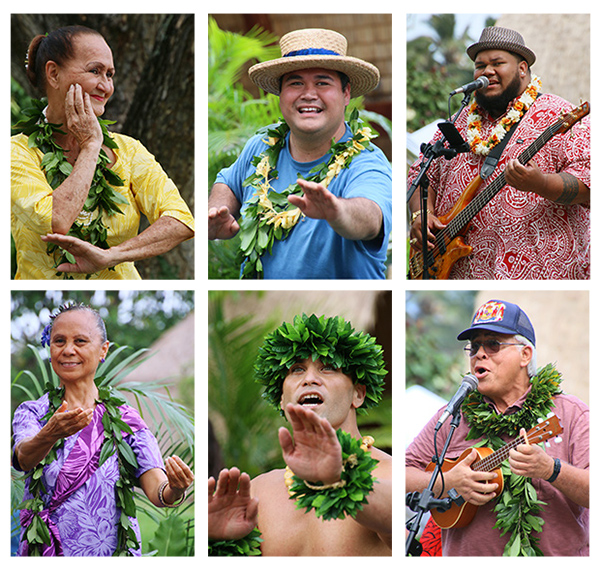
From the 28th annual Moanikeala Hula Festival at the Polynesian Cultural Center (clockwise, from upper left): Aunty Audrey Aukele solos for Ka Pa Nani ‘O Lilinoe; PCC kumu hula Pomaika’i Krueger; award-winning singer Josh Tatofi; Hawaiian culture expert and PCC retiree Cy Bridges; a Ke Kai O Kahiki dancer; and Aunty Sunday Mariteragi, who helped found the festival. (PCC photos by Mike Foley)
“Aunty” Sally Moanikeala Wood Naluai, the PCC’s first kumu hula
Pomaika’i Krueger, the PCC’s current kumu hula, explained that Aunty Sally, as everybody called her, served as the Center’s first kumu hula from 1963 until she retired in 1980. She remained as a hula consultant from then until she passed away in January 2000; but her influence lives on.
“She has left a great legacy here,” Krueger said, pointing out that during her time at the PCC she uniki’d or graduated four younger kumu who each all had distinguished careers at the Center and the surrounding community. The four are: Her niece, Aunty Sunday Kekuaokalani Mariteragi, who is largely responsible for founding the Moanikeala Hula Festival, and has operated her own ongoing halau for young people in the community for over 40 years; another niece, Aunty Ellen Gay Kekuaokalani Dela Rosa, Uncle Cy Bridges, and Uncle Keith Awai. Each of the latter three recently retired from the PCC with 40-plus years of service.
Krueger also said although he never met Aunty Sally, “I have been told many stories by her students. They all said that she had a very big heart that she gave to many people, and as a kumu she was very strict.”
“Those are very desirable qualities, and without them, hula wouldn’t be as refined as we see it today. We see hula being performed not only in Hawaii, but around the world. It is that beauty and refinement that makes it so popular.”
Dancing hula in honor of Aunty Sally
Except for a few transitional pauses and a longer break for the PCC’s Pageant of the Long Canoes, the 2018 Moanikeala Hula Festival continued throughout the afternoon, featuring:
>> Halau Kaleialohapoailani from Tokyo, Japan, under kumu Kayoko Toyoda, also known as Kaleipili Aloha, from Tokyo; and Hula Halau o Mahealani from Yokoyama City, Kanegawa, Japan, under kumu Yamada Michiyo.
After dancing, Toyoda said she was grateful for the experience “and the beauty of nature all around us with all our hula sisters today”; and Yamada expressed her “love for hula, for Hawaii and for its culture and traditions.”
“We’re grateful that they could come,” Krueger responded. “It’s amazing to see how many people around the world have embraced and love hula.”
>> Ka Pa Nani ‘O Lilinoe from Honolulu (at Manana Elementary School), under kumu Lilinoe Lindsey (who was unable to attend for health reasons).
>> Puananialoha from Aichi, Japan, under sensei (teacher) Yuko Kawamoto, joined Aunty Ellen Gay Dela Rosa, who has been working with them for the past three years, plus “some of her hula friends” from the community.
“The thing about the halau in Japan, they’re so eager to learn,” Dela Rosa said. “Why not? That’s what aloha is about. She brought eight students with her, but has about 100 students back in Japan.”
Live Hawaiian music
And as a special surprise, award-winning islands singer Josh Tatofi provided the beautiful vocals for the Puananialoha and Dela Rosa-and-friends performance of Ka Makani Ka’ili Aloha.
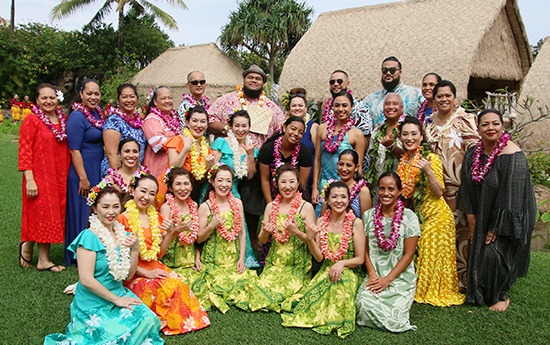
Participants in the 28th annual Moanikeala Hula Festival at the Polynesian Cultural Center pose with award-winning singer Josh Tatofi (back row, hat and beard).
Otherwise, some of the groups brought their own musicians, but the PCC Hawaiian Village “house band” provided most of the live music during the festival. The trio consisted of Kaipo Manoa, village manager and lead guitar; Kaipo’s son, Keanu Manoa, bass; and Makana Arce, a BYU-Hawaii junior vocal performance major from Hoolehua, Molokai’i, on ukulele, who took the lead all afternoon with a beautiful Hawaiian falsetto.
Arce later said he’s been playing and singing all his life, and he’s now studying opera “next door” at BYUH: “I want to pursue opera, and maybe teach choir as a side job,” he said.
Lines of hula genealogy and connections
Hawaiians involved in hula often trace their “genealogy” or connections to the generations of their respective kumu. A good example came in the next two groups.
>> Halau Hula ‘O Kekela, from Laie and the surrounding communities, under kumu Kela Miller. “It is very special for us to be here today in honor of Aunty Sally,” said Miller, who studied under Aunty Sally as one of the Polynesian Cultural Center’s original hula dancers.
Miller, the descendant of several of Laie’s most famous, historical kumu, first brought up Uncle Joe Ah Quin, who sang a beautiful Hawaiian solo. She also called up her own kumu, Cy Bridges, to sing and play ukulele for one of their numbers; and she featured eight of her granddaughters dancing in another number.
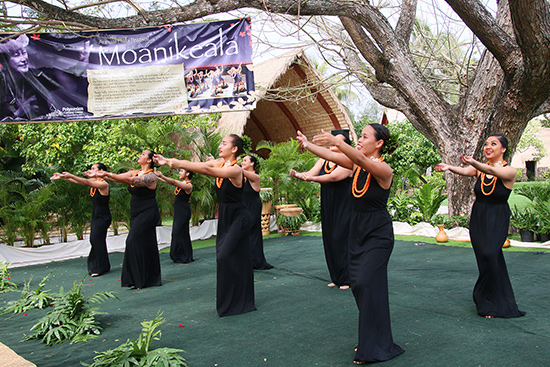
The granddaughters of Laie kumu Kekela Miller dance in the 28th annual Moanikeala Hula Festival at the Polynesian Cultural Center.
>> Ke Kai O Kahiki from Honolulu, next performed several hula kahiko numbers (in the ancient style, with only chanting, percussion and much more vigorous movements), under kumu La’akea Perry. Krueger pointed out that the late kumu, O’Brien Eselu, previously led this award-winning halau.
Perry is the grandson of Thomas “Uncle Five Cents” Au, a former Polynesian Cultural Center steel guitar player and one of the Laie kupuna recognized in the PCC’s Hukilau Marketplace. “Uncle Five Cents’ mother is a Ha’aheo, and her brother is the famous kumu hula Pua Ha’aheo,” Krueger explained. “Pua Ha’aheo was one of Aunty Sally’s kumu hula.”
“This is La’akea’s hula genealogy line. It’s important that we tell these stories, so we all know how we’re connected one to another,” he said.
The Moanikeala Hula Festival continues
>> Halau Kawai’ulaokala / Hui O Na ‘Opio, (also known as the St. Louis School halau, in Kaimuki, Honolulu, under kumu Keli’i Puchalski, hula kahiko.
>> Lahainaluna High School Hawaiian Club from Maui, under advisers and kumu ‘Ilima Greig-Hong, Lorraine Gomez, and also Krueger, who taught there before joining the Polynesian Cultural Center fulltime.
>> Hu’i Park Hula Studio from Honolulu, under kumu Kepo’omaikalani Park, whose dancers have appeared in the festival from the beginning.
>> Hui Ho’oulu Aloha: The Polynesian Cultural Center recently revived its own halau under kumu Pomaika’i Krueger. The group consists of PCC employees, BYU–Hawaii students and interested community members who Krueger has auditioned.
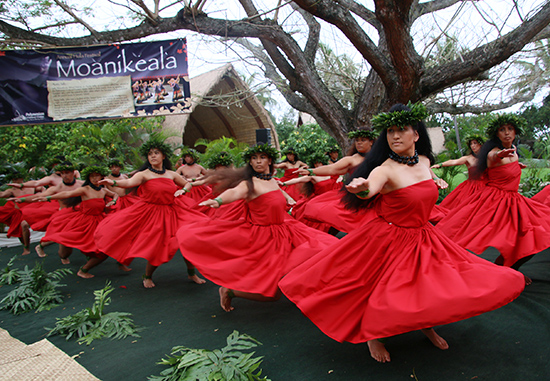
Hui Ho’oulu Aloha dances “Aia La o Pele i Hawaii.”
The festival concludes with Aunty Sally’s niece
>> Halau Napuananionapalionakoolau in Laie, under kumu Sunday Mariteragi.
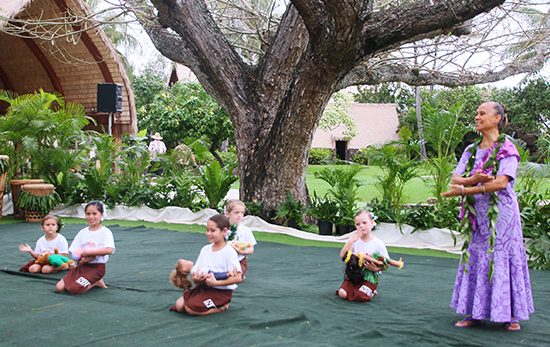
Aunty Sunday Mariteragi’s (right) youngest students dance the “Dolly Hula” lullaby.
Krueger explained Aunty Sunday began dancing hula at age 4, and started teaching her own students at age 12. Though still a teenager when the PCC opened in 1963, Aunty Sally asked her to be the group’s alaka’i or leader from 1963-70. After graduating from BYUH, Aunty Sunday worked with youth at Kahuku High, and soon opened her own hula halau for children on the side.
“Aunty Sunday continues to teach hula today, here at the Polynesian Cultural Center,” he said.
Hula unites us
“We’re grateful for all of you spending time at the Moanikeala Hula Festival,” Krueger said after Aunty Sunday’s halau performed.
He then invited the various kumu and anyone who knew the motions to join him in dancing to the namesake song, Moanikeala, written by Lena Machado for Aunty Sally. Then, as is customary, everyone stood, held hands and sang the song Hawai’i Aloha.
“Hula is something that truly crosses all ages,” Krueger said. “It’s not just something for young people. It’s also something not only alive here in our islands, but across the ocean and around the world. The way hula unites us and brings people together is such a beautiful thing.”
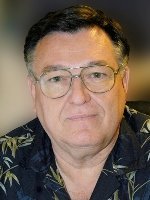
Story by Mike Foley, who has been a full-time freelance writer and digital media specialist since 2002. Prior to that he had a long career in marketing communications, PR, journalism and university education. Foley learned to speak fluent Samoan as a Mormon missionary before moving to Laie in 1967 — and still does. He has traveled extensively over the years throughout Polynesia, other Pacific islands and Asia. Foley is mostly retired now, but continues to contribute to PCC and various other media.

Recent Comments